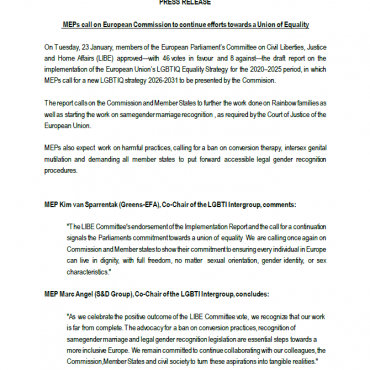Landmark Strasbourg ruling: Religious beliefs are no reason to oppose rights of same-sex couples
Today the European Court of Human Rights ruled that religious beliefs may not justify opposing the rights of same-sex couples. British laws prohibiting discrimination on the basis of sexual orientation were upheld.
 The Strasbourg court examined four cases brought by Christians, including two who argued their beliefs allowed them to refuse a service to same-sex couples.
The Strasbourg court examined four cases brought by Christians, including two who argued their beliefs allowed them to refuse a service to same-sex couples.
In the first case, Lillian Ladele was a civil registrar in London. She was dismissed because she refused officiating at civil partnership ceremonies for same-sex couples after it became legal in 2005. She claimed she was discriminated because of her faith.
The Court ruled there had been no discrimination, and that British courts—who upheld her dismissal—had struck the right balance between her right to freedom of religion, and same-sex couples’ right not to be discriminated.
In the second case, Gary McFarlane was a counsellor providing psycho-sexual therapy to couples. He was dismissed for refusing to work with same-sex couples, arguing this was incompatible with his beliefs. The Court ruled unanimously that there had been no violation of his right to freedom of belief.
Commenting this landmark ruling, Sophie in ‘t Veld MEP, Vice-President of the European Parliament’s LGBT Intergroup, said: “With this ruling, the court has established that freedom of religion is an individual right. It is emphatically not a collective right to discriminate against LGBT people, women, or people of another faith or life stance.”
“Religious freedom is no ground for exemption from the law. The court showed conclusively that the principle of equality and equal treatment cannot be circumvented with a simple reference to religion.”
Michael Cashman MEP, Co-President of the LGBT Intergroup, added: “British law rightly protect LGBT people from discrimination, and there is no exemption for religious believers. Religion and belief are deeply private and personal, and should never be used to diminish the rights of others.”
The ruling may be appealed within three months.
Read more:
- Read the Court’s official blog post
- Read the Court’s press release (PDF)
- Read the Court’s full ruling (PDF)
Image credits: Flickr/Marcella Bona






